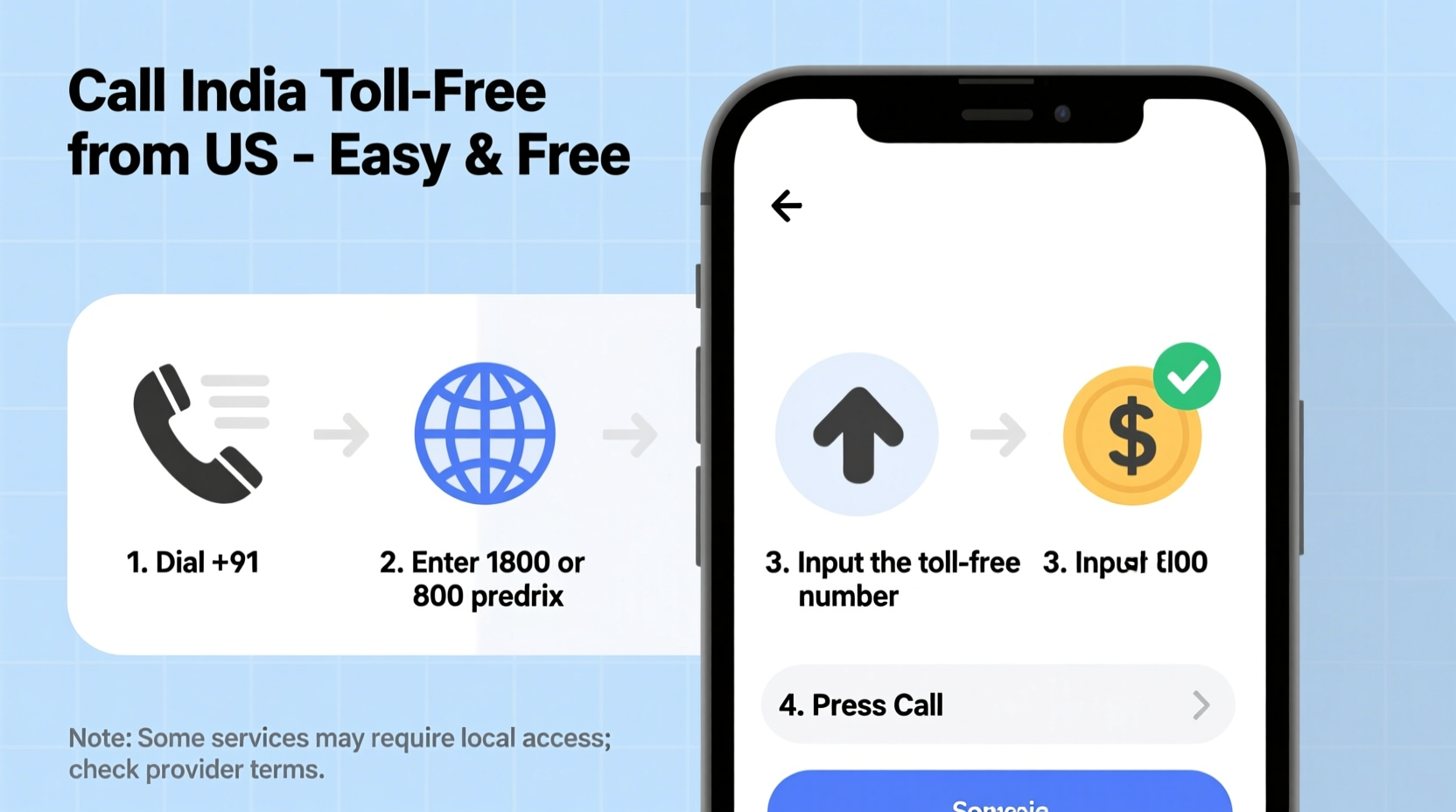Staying in touch with family, friends, or business contacts in India is essential for many Americans of Indian origin or those managing cross-border operations. However, one common challenge arises when trying to call an Indian toll-free number—such as a customer service line—from the United States. Unlike domestic toll-free calls, international toll-free numbers are not automatically accessible across borders. In fact, most Indian toll-free numbers (starting with 1800) are only valid within India. This creates confusion and frustration for callers abroad.
The good news is that there are practical, cost-effective ways to bypass this limitation. With the right tools and strategies, you can reach Indian toll-free lines seamlessly from the U.S. This guide breaks down everything you need to know—from understanding how toll-free routing works to using modern communication platforms that bridge the gap between countries.
Understanding How Indian Toll-Free Numbers Work

In India, toll-free numbers typically begin with prefixes like 1800 or 1-800 followed by six or seven digits (e.g., 1800-123-4567). These numbers allow domestic callers to reach businesses without incurring charges—the receiving company bears the cost instead. However, this system relies on geographic routing and local telecom infrastructure.
When you're outside India, your phone carrier cannot route your call through India’s domestic network. As a result, dialing a 1800 number directly from a U.S. landline or mobile will either fail or be treated as an international call to an invalid number. This doesn’t mean the number is unreachable—it just requires alternative methods.
“International toll-free access depends on bilateral agreements and technical gateways. Without them, direct dialing won't work.” — Rajiv Mehta, Telecommunications Analyst at GlobalCom Insights
Step-by-Step Guide to Accessing Indian Toll-Free Numbers from the U.S.
Follow this structured approach to successfully connect with Indian toll-free services from the United States:
- Identify the actual destination number: Many Indian companies publish their toll-free lines but also list a standard local number (often starting with 011, 022, 080, etc.). Check the company’s official website or contact support via email to request the non-toll-free equivalent.
- Dial using the full international format: Once you have the local number, use the international dialing sequence:
+91 [area code] [local number]. For example, if the local number is 022-4567-8900 (Mumbai), dial+91 22 4567 8900. - Use a VoIP service with low India rates: Services like Google Voice, Skype, or Vonage offer affordable per-minute rates to Indian landlines and mobiles. Google Voice, for instance, charges $0.01/min to landlines in India.
- Leverage callback or virtual number apps: Apps such as Rebtel, Viber Out, or TextNow provide cheaper international calling options and sometimes include free minutes.
- Contact the organization via alternate channels: If voice calling fails, use WhatsApp, email, or web chat—many Indian companies now offer multichannel support.
Best Tools and Platforms for Affordable Calling
Not all calling methods are created equal. Some offer better clarity, lower latency, and more predictable pricing than traditional carriers. Below is a comparison of popular platforms ideal for reaching Indian numbers.
| Service | Calling Method | India Landline Rate (per min) | Free Options? | Notes |
|---|---|---|---|---|
| Google Voice | App or browser | $0.01 | No (but very low cost) | Requires U.S. account; excellent audio quality |
| Skype | Skype-to-Phone | $0.023 | Credit purchase required | Prepaid credit model; reliable for long calls |
| Rebtel | Callback or app call | $0.019 | Yes (limited free trial) | No connection fees; uses local gateways |
| Viber Out | App-based | $0.021 | Purchase required | Good integration with mobile contacts |
| Traditional Carrier (e.g., AT&T) | Mobile/landline dialing | $0.39–$0.59 | No | Expensive; prone to poor routing |
As shown, VoIP solutions are significantly more affordable than traditional phone services. A 30-minute call to Mumbai would cost less than $1 using Google Voice, compared to over $15 with a major U.S. carrier.
Real Example: Connecting with Indian Bank Support
Sunita Patel, a software engineer based in Austin, Texas, needed to resolve an issue with her ICICI Bank account in Hyderabad. The bank’s website listed only a 1800 toll-free number for customer service. When she dialed it from her iPhone, the call failed repeatedly.
Instead of giving up, Sunita visited the ICICI website and used the “Contact Us” section to find the non-toll-free customer care number for international callers: +91 22 6752 5555. She then used her Google Voice app to place the call at $0.01 per minute. The call connected clearly, and she resolved her issue in under 20 minutes—all for a total cost of $0.20.
This case illustrates how a small amount of research combined with the right tool makes a big difference.
Checklist: How to Call Indian Toll-Free Numbers from the U.S.
- ☐ Confirm whether the Indian number has a local or international dial-in option
- ☐ Search the company’s website for a non-toll-free contact number
- ☐ Format the number correctly: +91 [area code without leading zero] [local number]
- ☐ Choose a low-cost VoIP service (Google Voice, Skype, Rebtel)
- ☐ Test the call during Indian business hours (typically 9 AM – 6 PM IST)
- ☐ Have a backup plan (email, WhatsApp, web form) if voice fails
Frequently Asked Questions
Can I call an Indian 1800 number directly from my U.S. phone?
No, Indian toll-free numbers are not accessible from outside India. Direct dialing will either fail or result in an error message. You must use the organization’s local number instead.
Are there any truly free ways to call Indian toll-free numbers?
There is no way to directly call an Indian 1800 number for free from the U.S. However, many companies offer free support via WhatsApp, web chat, or email. Additionally, if the recipient has a VoIP line or uses apps like WhatsApp or Telegram, you can call them free of charge.
Does using VoIP affect call quality?
Call quality depends on your internet connection. With a stable broadband or Wi-Fi connection, VoIP services often provide clearer audio than traditional mobile networks. Avoid using public Wi-Fi for sensitive conversations due to potential lag or security risks.
Expert Tips for Consistent Success
Another effective strategy is setting up a Google Voice number linked to your Gmail. Since it integrates with your smartphone and computer, you can make calls without switching devices. Plus, all your call history is logged online for easy reference.
If you regularly communicate with Indian offices, consider purchasing a rechargeable Indian SIM card with a local number through services like BharatSim or OneSimCard. These allow you to receive calls in India while abroad and sometimes offer incoming-free plans.
Final Thoughts: Stay Connected Without Breaking the Bank
While Indian toll-free numbers aren’t directly reachable from the U.S., the workaround is simple and inexpensive. By identifying local equivalents and leveraging modern communication tools, you maintain seamless access to critical services back home. Whether it’s resolving a banking issue, checking flight status, or supporting a family member, the right method ensures you’re never out of touch.
Technology has erased many barriers in global communication—don’t let outdated assumptions about toll-free numbers hold you back. With a little preparation and the right app, calling India is easier than ever.









 浙公网安备
33010002000092号
浙公网安备
33010002000092号 浙B2-20120091-4
浙B2-20120091-4
Comments
No comments yet. Why don't you start the discussion?